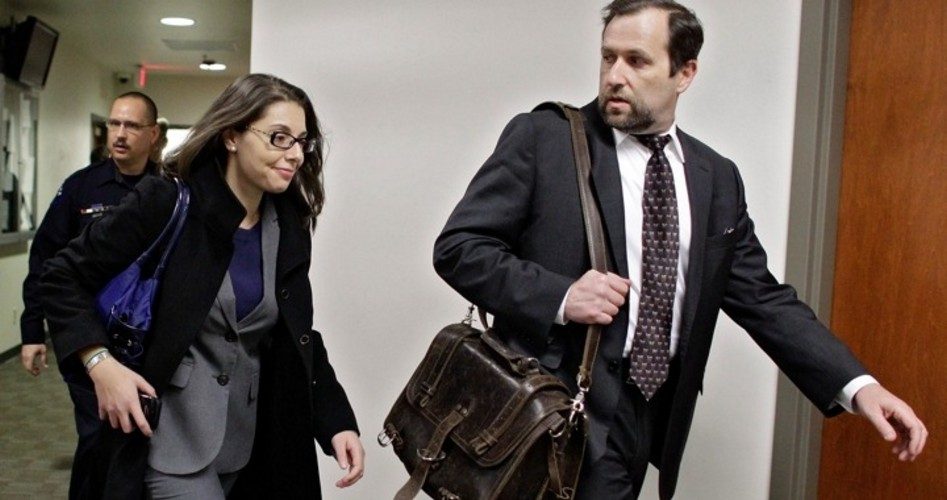
Fox News reporter Jana Winter (shown) is so committed to keeping secret the identity of her sources of information in the Aurora, Colorado, movie theater shootings that she is willing to face jail time rather than expose the unnamed persons. Though both a Colorado judge and a New York judge have ordered her to turn over her notes related to the killings — that likely contain the names of her law-enforcement sources — Winter has so far refused.
On July 20, 2012, James Holmes opened fire on unsuspecting patrons in a movie theater in Aurora, Colorado, killing 12 and injuring 70. Fox News sent Jana Winter to cover the aftermath. Just five days later, Winter broke her exclusive story that Holmes had forwarded a notebook to a University of Colorado psychiatrist “filled with details about how he was going to kill people.” Her story was based on information she had received from law-enforcement sources who were not to discuss the case because of a gag order issued by County Judge William Sylvester.
Forbes reported,
As one might expect, the defense attorneys were not happy with the revelation, claiming that the failure of the unnamed sources to honor the gag order — and Winter’s reporting of what she had learned — violated Holmes’ right to receive a fair trial.
The defense team began an investigation into the violation of the gag order, and called a number of law-enforcement officers to the stand, all of whom denied having leaked the information. It was at that point that the defense team persuaded Colorado Judge Sylvester to issue an order forcing Winter to turn over her notes on the story. But because Winter lives in New York, she could not be forced to comply with the order.
Manhattan Judge Larry Stephen then stepped in to offer his assistance and signed off on a subpoena requiring Winter to turn over all her materials associated with the Holmes case, as per the Colorado judge’s order.
Winter is holding her ground, however. In an affadavit filed with the court, she stated,
In all of the time that I have worked as a journalist, I have always maintained my commitments to sources to keep the identities of confidential sources safe from disclosure. As a result, I enjoy an excellent reputation as an investigative journalist among my peers, and, as importantly, among the sources upon whom I rely to obtain information for my reporting. If this reputation were tarnished, it would severely compromise my ability to gather news, and would assuredly result in critical reports on public issues never seeing the light of day.
Winter’s stance is not simply on behalf of herself but for all reporters, who know that one’s sources are an absolute necessity, guaranteeing the public’s right to information.
Though Colorado’s Shield Law is supposed to protect any reporter from having to reveal a source, it does include provisions that allow a judge to circumvent it and compel a reporter to provide the ordered information to the court. Forbes explained:
Should the court determine that the reporter’s information is directly relevant to a substantial element in the case; that the information cannot be obtained by any other reasonable means; and that the interests of the party seeking disclosure (in this case Mr. Holmes) outweighs the First Amendment rights of the reporter, along with the public’s right to receive the news, the court can ignore the Shield Law and force the reporter to provide all requested information.
According to Winter’s attorneys, her testimony is not “directly relevant” to Holmes’ crime, and forcing her to reveal her sources would destroy her career.
The judge “has said that he recognized that a resolution of Holmes’s motion here could result in Jana facing what he described as a Hobson’s Choice between burning her sources, and thus destroying her career, or facing punishment for contempt of court,” said Dori Ann Hanswirth, one of Winter’s attorneys.
On April 10, the Colorado court is set to determine whether the exceptions to the Shield Law apply, and in turn, whether Winter will be forced to reveal her sources or face a jail sentence of up to six months.
However, as of Monday evening, District Court Judge Carlos Samour, Jr. ruled that he must decide whether Holmes’ notebook is admissible as evidence in Holmes’ trial before ruling on whether Winter will be forced to testify.
Forbes noted that despite the implications of such a situation on the media, very few outlets are even reporting on this story, most likely because Winter is employed by a conservative news outlet. It asked,
Were this happening to a Washington Post or New York Times reporter, does anyone believe that there would be a virtual blackout on a story where the reporter is threatened with jail time for protecting a source?
“I think this is something that journalists, regardless of the outlet you work for, should be concerned about,” wrote conservative blogger Matt K. Lewis. “I certainly hope that the fact that she is from Fox News isn’t impacting the coverage you see from other outlets. I would hope that we would see more journalists stepping forward.”
First Amendment rights advocates have recognized the significant implications of this issue.
For instance, First Amendment lawyer Floyd Abrams asserted,
In most cases involving a journalist trying to protect their confidential sources, an argument can at least be made that the testimony of the journalist is needed for some reason, like when a journalist interviews a defendant.
But here Jana had no information and no knowledge at all relating to the guilt or innocence of the defendant, or whether he should get capital punishment if he is convicted, or the like.
Is it worth the time, effort, and harm done to First Amendment and free press principles to go after a reporter who has done nothing more than obtain information of a highly newsworthy nature?
Photo of Jana Winter: AP Images




